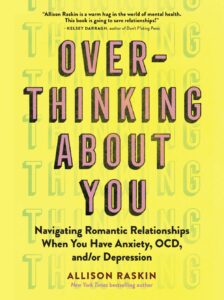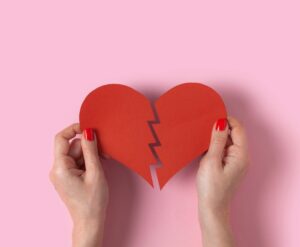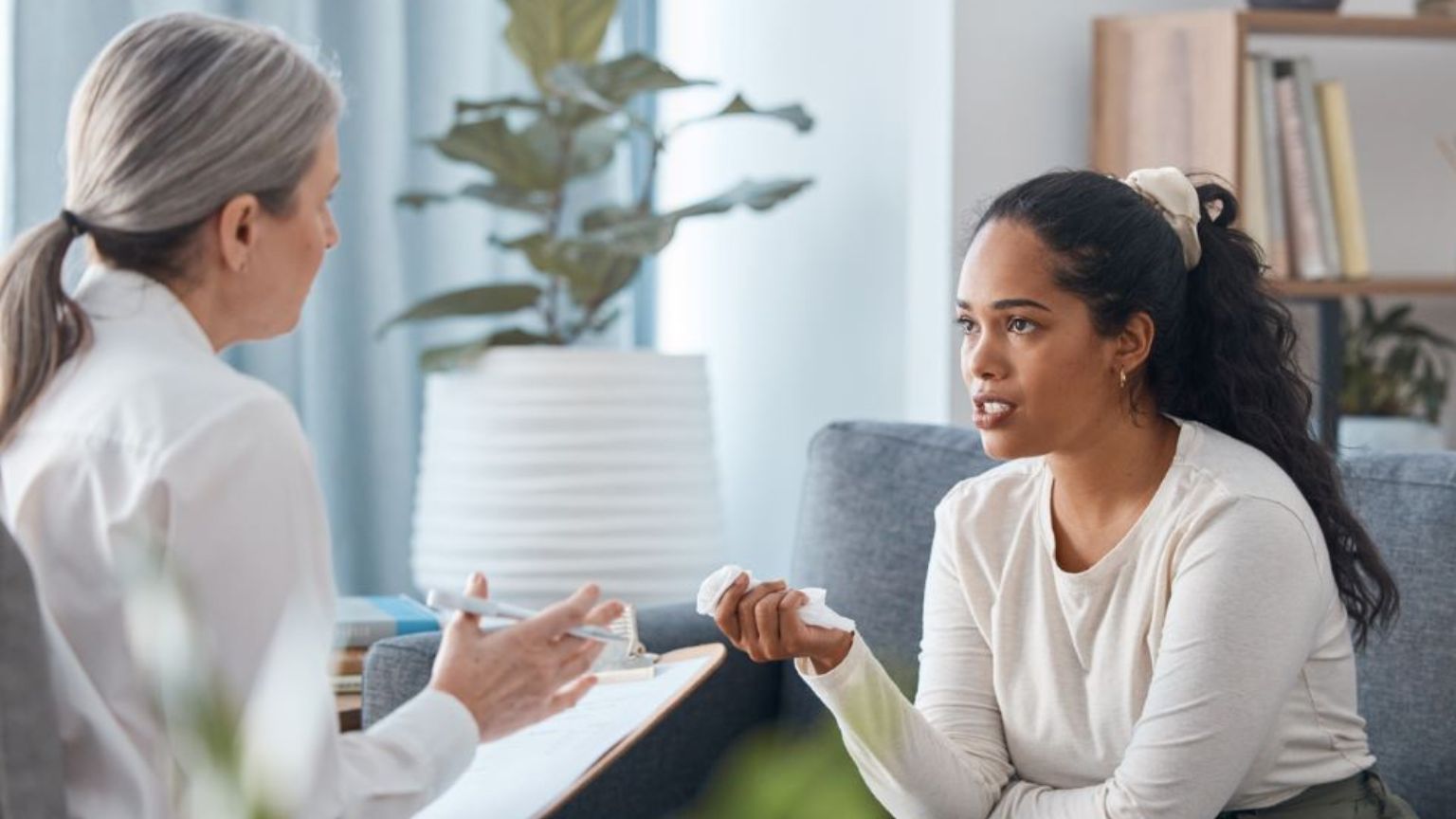Mental Health and Dating – Healthista spoke with Allison Raskin to discuss topics from her book on how to navigate romantic relationships when you have anxiety or depression
Dating is hard, but we don’t need to tell you that. Dating while dealing with a mental health condition? That can be even more difficult.
Prevalence of depression and anxiety has increased by 25 per cent
The mental health crisis has only worsened since the start of the COVID-19 pandemic, according to the World Health Organization. Of this increase, women and youth have been affected the most.

Allison Raskin, author of Overthinking About You: Navigating Romantic Relationships When You Have Anxiety, OCD, and/or Depression, has dealt with mental health conditions for almost her whole life, which has had large impacts on her dating habits.
But, in 2019, Raskin noticed she was ‘dating differently’ and wasn’t falling into obsessive tendencies or getting as anxious as before.
‘I had spent the majority of my life dating in a really, kind of maladaptive way, where it would really exacerbate my mental health, where it felt like an area of my life that I lost control of myself in,’ Raskin says.
This shift in her life inspired Raskin to write Overthinking About You about navigating dating while living with mental health conditions.
From handling breakups better to talking about mental health with your partner to finding the right person to date, Raskin touches on every aspect of romantic relationships in her book….
READ MORE: Feeling ‘meh’? Everything you need to know about anhedonia – the missing word in mental health
The importance of the way you view a relationship
The main obstacle that mental health conditions pose in a relationship is affecting the way you view dating.
‘If you have a schema that you are unlovable because your depression is telling you that you’re worthless, then every action that the other person takes is gonna be seen through that lens,’ Raskin says.
Other situations, like your partner taking longer to respond one day or the tone of voice they use in a conversation, can also be seen through various lenses that affect the way you view the relationship.
This can lead to leaps in logic, heightened emotions and overthinking, which can cause further stress and worry, according to Raskin.
You can go from A to C in a lot of ways that neurotypical people might not
Raskin says taking a step back and looking at the things you believe about relationships is critical to understanding your dating habits and what works best for you. It’s important to examine your own schemas surrounding dating so you can better understand your expectations, your wants, your needs and yourself.
READ MORE: 5 common dating mistakes you could be making

Talking about mental health with your partner
Another hurdle Raskin mentioned is the daunting task of talking about your mental health history with your partner.
It can be worrying to think about how your partner will react or what they will say when you share a vulnerable part of your life with them. This fear, while valid, can deter you from pursuing a relationship altogether.
Raskin says you should not share your mental health history compulsively or as a ‘test’ to see if they will reject you.
Sharing a deeply personal part of your life should not be a rash decision and should come from a place of wanting to become closer with your partner.
However, when you do share your mental health history with a partner, you want to make sure they are curious and want to learn more about your situation, rather than being dismissive.
‘You don’t need to be convincing somebody that your issues are real issues,’ Raskin says.
READ MORE: ‘Don’t tell me to cheer up’ – 10 positive mindset steps for your Mental Health

How to handle breakups better
The end of a relationship is difficult as is, but existing mental health conditions can often exacerbate the situation.
After being broken up with, it’s easy to beat yourself up over it and have a lot of ‘what if’ thoughts. So, not only do you have to deal with the loss of a relationship, but you also have to deal with, as Raskin says, ‘your own brain attacking you.’
These ‘what if’ thoughts can be extremely damaging while trying to recover from a breakup, especially if you have a mental health condition such as anxiety.
‘It’s your brain trying to solve a problem that is irrelevant because the past is in the past,’ Raskin says.
‘There’s no use in trying to fill in these what-if thoughts.’
To stop these thoughts, Raskin recommends a ‘radical acceptance’ of the breakup, rather than trying to redo the relationship in your brain, as this can create more problems.
While this is easier said than done, Raskin says to focus on the actual loss, acknowledge your current pain and concentrate on grieving right after the breakup. This way, you can process the breakup in the present while trying not to compound your grief with destructive thoughts.
It’s also important to prioritize yourself and accept support from people you trust
When Raskin’s fiancé left her, everyone in her life rallied around her and became a strong support system for her, something that helped her immensely.
‘Really letting myself soak that in and fully appreciate that one person left but all these other people are still here and all these other people are stepping up,’ says Raskin.
‘There was so much beauty and power in that.’
While accepting support and being kind to yourself during a difficult time can be hard, it’s crucial for making your recovery easier. Taking the time and energy to be more compassionate toward yourself is one of the biggest factors in making yourself feel better after a breakup.
‘Time on its own isn’t gonna heal you,’ Raskin says.
‘It’s time plus active steps.’
READ MORE: 10 signs you’re ready to date again after a break up

How to find the right person to date from the beginning
While breakups mark the end of a relationship, it’s important to know how to avoid a potential unhealthy relationship when you are attempting to start a new one.
A lot of advice for people with mental health disorders trying to find the right person can also be applied to people without these types of conditions as well.
When pursuing a new relationship, Raskin says it’s a good idea to look at your dating history to see what works and doesn’t work for you. Looking at aspects like your preferred communication style or whether you want to date a proactive planner can help you avoid situations that didn’t work for you in the past.
Also, Raskin highly recommends communicating what you are looking for and what you want out of the relationship from the very beginning.
It’s important that your partner’s wants align with yours to prevent confusion and conflict down the road
‘If ultimately the two of you are looking for two completely different things, you’re just asking for trouble,’ Raskin says.
Finally, a healthy relationship has a foundation of acceptance, understanding and compassion. This is especially true for people who struggle with their mental health.
Make sure you don’t forget the basic qualities of a relationship when you are trying to get into one!
READ MORE: Love advice to my younger self

There is hope!
Trying to juggle the complicated world of dating and your mental health conditions can be overwhelming, but Raskin makes it clear that despite your struggles, you will find someone for you.
The last page of her book says it best: ‘Don’t give up on yourself, and don’t give up on love.’
 Allison Raskin is a New York Times bestselling author who has written three books about the intersection between mental health and romantic relationships.
Allison Raskin is a New York Times bestselling author who has written three books about the intersection between mental health and romantic relationships.
She also has a podcast and an Instagram focused on mental health, along with a hugely popular YouTube channel that has over 600,000 subscribers and almost 180 million views.
Like this article? Sign up to our newsletter to get more articles like this delivered straight to your inbox.



















































